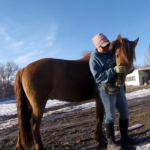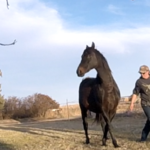Is There A Practical Application For That?
Spending some time with horse friends the other day we talked about some of the tricks my horses can do.
I was asked the question, “Is there a practical application for that?”
I was caught unaware and without and answer. Is there a practical application for a horse knowing colors? For being able to bow or smile or give a fist bump or Spanish walk? Umm, no? I was unable to come up with an answer to what you could use those exact behaviors for. We all laughed and said fetch prevented you from having to get off tog et your hat when it blows off. The real question went unanswered though.
I haven’t been able to get it off my mind.
What possible benefit is there to teaching a horse silly’ tricks?
The true answer to that goes so far beyond the act of the trick itself. The benefit to teaching any trick goes into ever other aspect of riding and interacting with the horse.
By teaching a trick we engage the horses brain. We ask him to think, to use his mind and work through a problem instead of reacting. By teaching new skills a horses brain builds new connections allowing him to follow new thought paths instead of the same old ones that lead to the same old behaviors. A horse, any animal, with a greater repertoire of behaviors is better able to help himself in difficult or scary situations. There is a wonderful example in a story from a zoo in Mexico. There was an earthquake and the animals who had been trained were able to find ways to save themselves. Far fewer trained animals died than untrained even though they shared the same habitat. Think how useful that will be when your horse spooks out on the trail or gets caught in wire.
By teaching a horse tricks we teach them that things which might otherwise be considered scary are actually fun toys. A tarp? Not scary, a great thing to stand on and receive rewards. A plastic bag blowing in the wind? No reason to run. Chase after it instead and when you catch it grab it to hand up to your person. By teaching the horse to interact with unusual objects we take away fear and build confidence. The horse learns to overcome fear as a fun game that he wants to play instead of running scared in a round pen.
By teaching tricks we teach our horses that WE are fun to be around. Working on traditional training we can become overly focused on results and perfection. Sometimes it becomes not so fun for the horse resulting in a horse that is hard to catch and has no interest in being around us. By taking the pressure off and playing instead we can become interesting again. All while building skills that will benefit the more serious sides of riding. Taking the time to add a few tricks in while working on other training can serve as a reward for sticking with you on the not so fun stuff.
Teaching tricks can make training fun again but it also helps with all other training. Everything we do with a horse is a trick to the horse. They don’t know that fetch is silly but having a person on their back is not. Everything we teach a horse helps everything else we do with a horse. Or hurts if they don’t enjoy what you are doing. Teaching tricks builds trust and communication. When your horse wants to listen to you and understands what you are asking it will improve everything you do with your horse. Not to mention the confidence and lack of fear that makes it easier to work on other aspects of training.
In the end the practical application seems to be that teaching tricks improves everything! That is the most practical application I could ask for in anything. Once you get used to the freedom and joy in working that teaching tricks brings into your relationship with your horse is can be difficult to get beck to ‘normal’ horse training in the way that you knew it before. Halters become an extra and a nuisance. Horses come running asking to work. Remembering why you ever did anything differently becomes the difficult thing.



I love everything you said here. I’ve had people ask similar questions. To me, the answer boils down to the following:
You are encouraging and shaping the horse’s “try”. Horses who learn to seek rewards through “silly tricks” are more willing to seek answers under saddle, even when their riders aren’t asking 100% perfectly every time. It opens a channel of communication that spills into the rest of your interactions with the horse.
Also… is there a practical application to having horses at all? We don’t need them for our survival. They’re purely recreational for most of us.
I love that! What a great way to put it. I missed that aspect all together.
But I do believe there is a practical application to having horses. How would we survive without them! That seems pretty important 😉